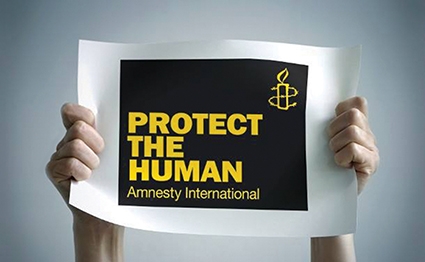Amnesty International Annual Report Includes Key Events in Georgia
In its annual report, global movement Amnesty International called on people around the world not to let the rhetoric of fear, blame and hate erode the vision for an open society based on equality.
The Report shows the state of the world’s human rights during 2016 in 159 countries of the world and includes key events in Georgia, highlighting that concerns persist regarding the lack of judicial independence, selective justice, and political interference following a series of favorable rulings for the government in high-profile cases.
The Report also mentions the secretly recorded private conversations and intimate activities of opposition figures and journalists that were leaked ahead of the October 8 parliamentary elections, noting that five people, including a former security official, were arrested on suspicion of being responsible for illegally obtaining said recordings.
Regarding freedom of expression, the Report notes that on February 15, 2016, Georgian Parliament dropped a bill that sought to make “insulting religious feelings” an administrative offence. The bill had been approved by the parliamentary Human Rights Committee and sought, among other things, to penalize criticism of religious leaders.
The report also covers developments in Georgia’s breakaway regions of Abkhazia and South Ossetia, noting that the de facto authorities and Russian forces in the breakaway regions continue to restrict movement across the administrative boundary line, which includes detaining dozens of people. The report referred to a number of detainees who complained of torture and other ill-treatment, including beatings, during the prolonged arbitrary detentions.
“On 19 May, a man was killed by a Russian soldier while trying to cross into Abkhazia. An investigation into his death by the de facto authorities was ongoing at the end of the year,” the Report says.
Moreover, the document reads that amid concerns about the actions of law enforcement officers, the government failed to bring forward legislation to create an independent investigation mechanism for human rights violations committed by law enforcement bodies.
The report also mentions the Rustavi 2 TV case, saying that on June 10, the Tbilisi Court of Appeals upheld the 2015 ruling of the lower court, which had transferred ownership of the pro-opposition broadcaster, Rustavi 2, to its former owner. He claimed that he sold the company more than a decade earlier under pressure from the government at that time.
“The litigation took place after the statute of limitations had expired, and was widely believed to have been supported by the current government with a view of depriving the UNM of its main mouthpiece ahead of the parliamentary elections,” the Report reads.
The overall tone of the Report makes it clear that while there has been some progress in safeguarding human rights, in 2017 the world feels unstable and fearful of the future.
“Yet, it is in these times that courageous voices are needed, ordinary heroes who will stand up against injustice and repression. Nobody can take on the whole world, but everyone can change their own world. Everyone can take a stand against dehumanization, acting locally to recognize the dignity and the equal and inalienable rights of all, and thus lay the foundations of freedom and justice in the world. 2017 needs human rights heroes,” the document reads.
Amnesty International is a global movement of more than 7 million people who take injustice personally. The movement investigates and exposes facts about rights violations, whenever and wherever they occur.
Thea Morrison












